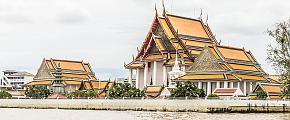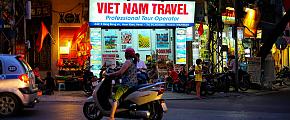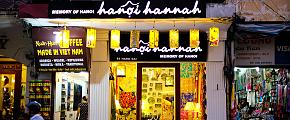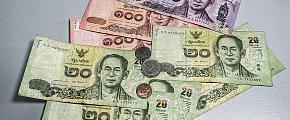Thai Traditional Costumes: Types, Wearing & Buying Tips
The colorful Thai traditional costumes vividly reflect the country's rich cultural heritage. Getting to know the history and significance of Thai outfits during Thailand tours, you will uncover a world of fun and fascination. From intricate patterns to unique fabrics, each garment tells a story that deepens your connection to Thai culture.
What are Thai Traditional Costumes
Thai traditional costumes, known as "Chut Thai", are not just garments but a recognition of Thai identity, art, and craftsmanship. Suitable for men, women, and children, these outfits showcase the historical significance that has been preserved through generations.
"Chut Thai" comes in many varieties, with differences based on region and gender. Like in the Northern part, women often wear the Lanna costume, characterized by a colorful tube skirt (pha sin) and a long-sleeved jacket. In contrast, the Southern region's costume includes a wrap-around skirt and a fitted blouse, indicating the area's cultural influences from Malaysia and Indonesia.
There is only one official outfit for men, known as the formal national costume. However, women have a wider variety with eight different designs. Take a quick look and find the features of these traditional costumes in Thailand, and learn about the occasions they are suitable for.
Types of Thai Outfits for Men
Men's traditional Thai clothing typically includes a tailored shirt (often with intricate designs), trousers, and a wrap-around cloth called chong kraben.
Suea Phraratchathan: Most formal attire
| Occasions | Features |
| Royal ceremonies and official events like weddings. | A long-sleeved shirt with a standing collar, usually made from silk or fine fabric, paired with trousers. |
Types of Thai Outfits for Women
Women's traditional Thai clothing usually consists of a blouse (often with elaborate embroidery), a skirt (pha nung or sinh), and a shawl-like garment (sabai).
Chakkri: Formal and elegant attire
| Occasions | Features |
| Royal ceremonies and official events, daytime engagement ceremonies, or weddings. | It is what most people think of when they refer to traditional Thai clothing. A sash (sabai) is draped over one shoulder for added elegance, and a full-length wrap-around skirt with two pleated folds in the front (sinh), is adorned with intricate patterns and embroidery. |
Boromphiman: Formal evening attire
| Occasions | Features |
| Formal or semi-formal events such as the League Ceremony or royal functions. | A long-sleeved shirt with a standing collar, usually made from silk or fine fabric, paired with trousers. |
Siwalai: Formal and elaborate evening attire
| Occasions | Features |
| Royal ceremonies and special occasions. | Similar to Boromphiman, but has an over-shoulder sash. |
Dusit: Western-style evening attire
| Occasions | Features |
| Less formal evening events. | A tailored Western-style sleeveless dress and a Thai-style skirt, generally worn with a belt, the skirt and top are sewn together so that they form a one-piece dress. |
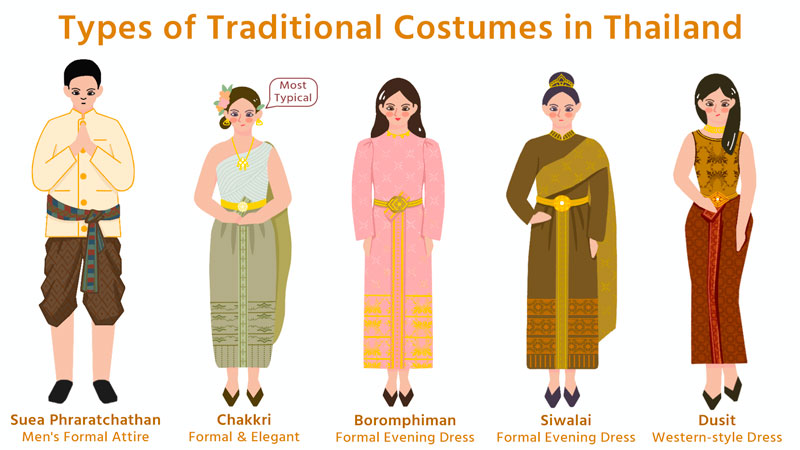 Types of Thai Traditional Costumes
Types of Thai Traditional Costumes
Chakkraphat: Extremely formal and elaborate attire
| Occasions | Features |
| Only be worn for very important royal or national ceremonies, like formal banquets and official dinners. | The name means "emperor". A long tube-like skirt and a top, a highly-ornate shawl layered over another sabai. It is embroidered with intricate patterns and made with beautiful fabric. |
Amarin: Formal evening attire
| Occasions | Features |
| Formal and ceremonial occasions, like an evening dinner or at the Royal Birthday Procession. | Made of brocaded fabric, worn with royal decorations. A heavily embroidered long-sleeved blouse and a brocade skirt. The beauty of this Chut Thai is its textile and accessories. |
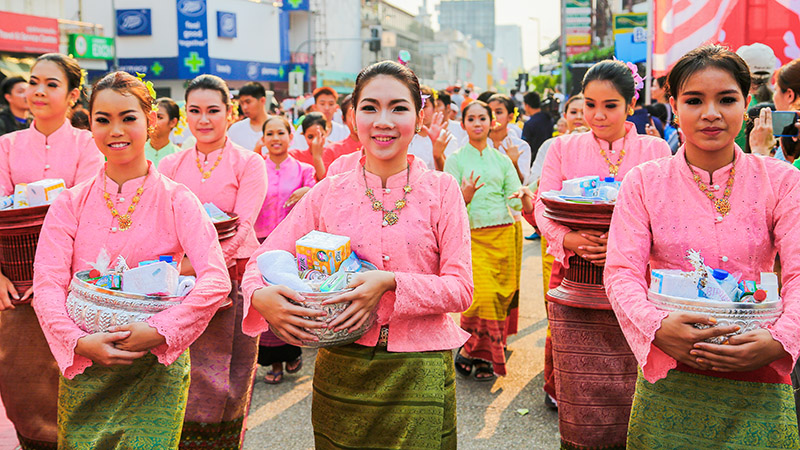 Girls in Amarin
Girls in Amarin
Chitlada: Semi-formal daytime attire
| Occasions | Features |
| Daytime events, such as welcoming the official royal guests at the airport. Black versions of it are worn at funerals or during periods of mourning. | A silk blouse with long sleeves and short standing collar, a plain or subtly patterned skirt. |
Ruean Ton: Most casual of all Chut Thai outfits
| Occasions | Features |
| Daily activities and informal gatherings. | A collarless blouse with elbow-length sleeves and a tube-like skirt, made from cotton or silk. The blouse has a row of buttons at the front and is tucked into the skirt, the skirt may be plain or embroidered with regional designs. |
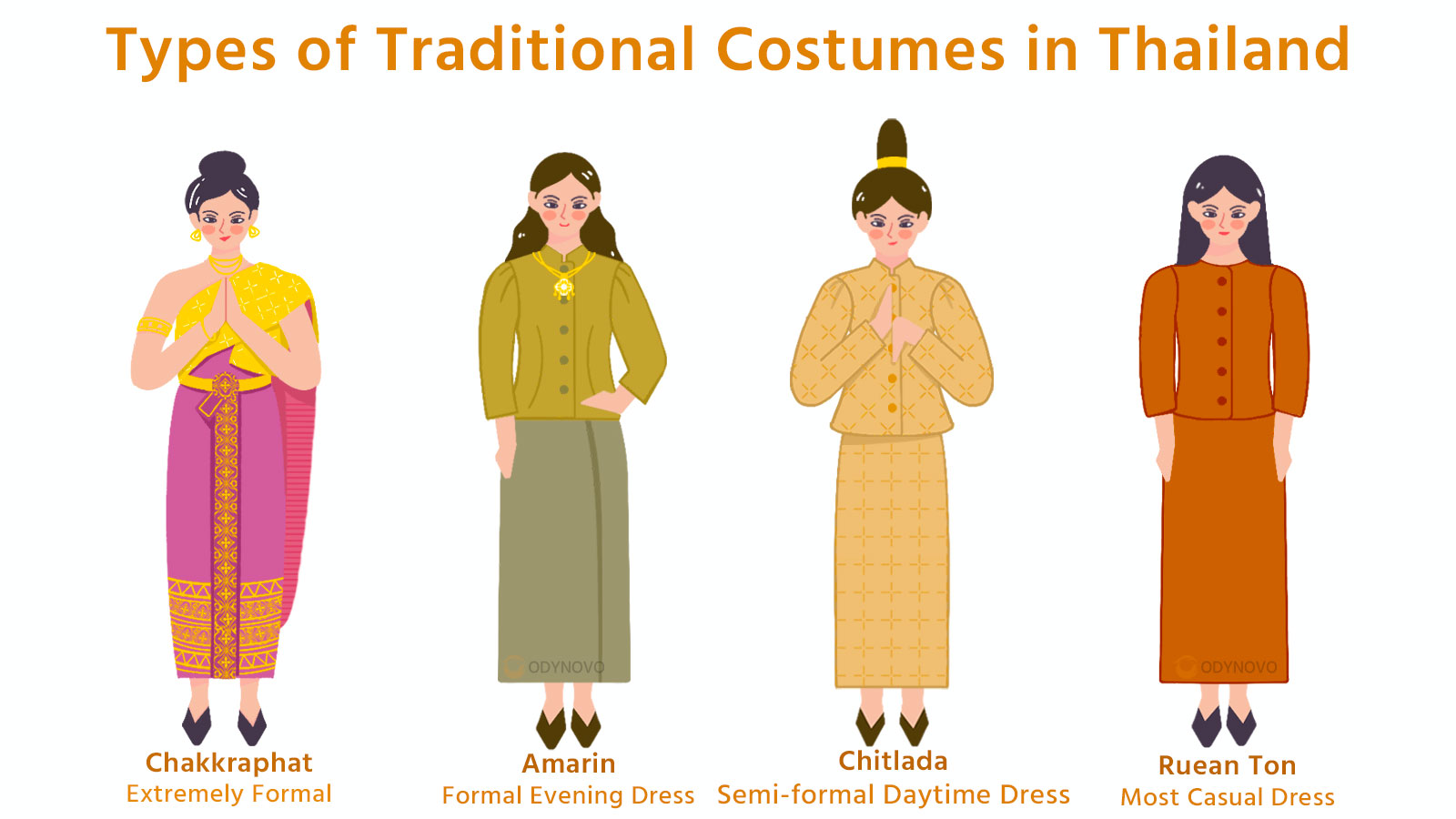 Types of Thai Traditional Costumes
Types of Thai Traditional Costumes
Can I Wear Thai Traditional Costumes
Absolutely, you can wear traditional Thai clothing during your trip to Thailand! It is one of the most fascinating ways to immerse yourself in Thai culture. Imagine stepping into the elegance of ancient Thai royalty or the charm of local villagers while exploring the stunning landscapes and historic sites.
You can rent Thai outfits at various tourist spots, such as The Grand Palace and Wat Arun in Bangkok, the Historical Park in Ayutthaya, the Old City in Chiang Mai, and Nong Nooch Tropical Botanical Garden in Pattaya. Additionally, many cultural centers, historical sites, and tourist attractions offer professional photography services so you can capture the moment with stunning photos.
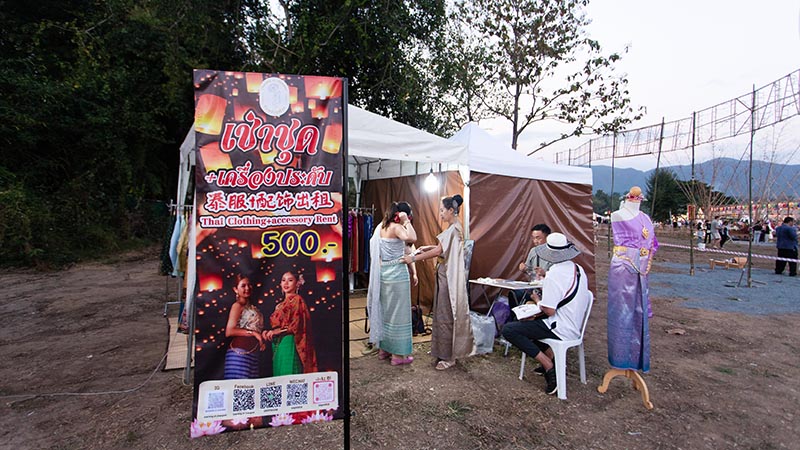 Travelers Experiencing Thai Traditional Costumes
Travelers Experiencing Thai Traditional Costumes
How to Experience Thai Culture Through Traditional Costumes
Visit Museums
The Queen Sirikit Museum of Textiles is a must-see if you are interested in Thai traditional costumes. Located within the Grand Palace Complex in Bangkok, it houses extensive collections of traditional Thai garments, royal attire, and intricate textiles, dedicated to preserving and promoting Thailand's rich textile heritage. The highlight of the museum is the exhibition of royal clothing worn by Queen Sirikit, showcasing the elegance and craftsmanship of Thai silk.
Visit Heritage Village & Local Markets
Explore villages and markets such as the Thai Silk Village and Phahurat Textile Market, where you can witness traditional weaving practices and other cultural activities. Get to know the material and production process of Chut Thai and gain a deeper appreciation for Thailand's textile heritage.
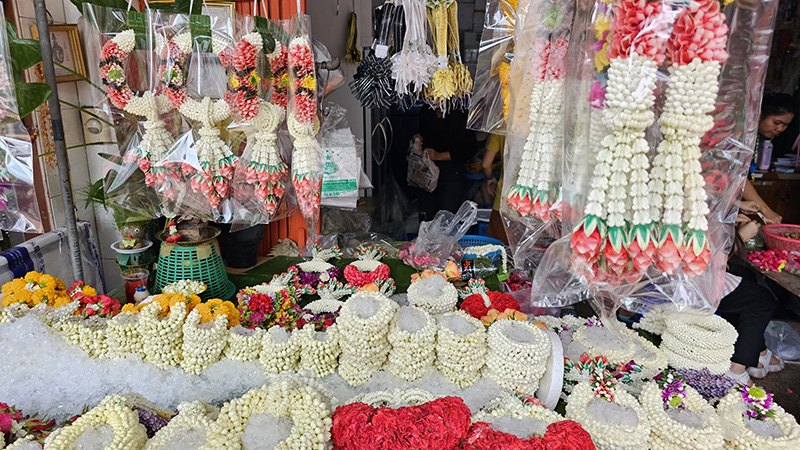 Flower Market, Bangkok
Flower Market, Bangkok
Traditional Costume Workshops Hands-on Experiences
Various silk farms and workshops in Bangkok and Chiang Mai offer in-depth classes on Thai silk production, showcasing how to weave and dye fabrics. You can take a Thai traditional crafts class to learn from local artisans the art of creating and wearing traditional Thai costumes, and truly feel a part of the rich Thai heritage.
Where to Buy Thai Traditional Costumes
Chatuchak Weekend Market
This market in Bangkok offers a variety of traditional Thai clothes, including intricately designed outfits and silk garments. However, if you are interested in buying Thai silk, we recommend visiting established fabric shops.
Pahurat Textile Market
It is a great choice, offering numerous fabric shops with a variety of fabrics, including traditional Thai textiles. Known for its extensive selection and competitive prices, the market is a go-to spot for custom-made clothing and traditional Thai outfits. If time permits, tailor shops are an excellent choice. You may consult your guide about visiting a local tailor shop, as they offer tailored services to cater to your preferences.
Narai Phand
Besides, you can visit Narai Phand for a range of traditional Thai handicrafts, including high-quality silk fabrics. This government-sponsored shop showcases a diverse collection of Thai handicrafts sourced from villages across the country. Here, you will find authentic Thai products and take home a piece of Thailand's rich cultural heritage.
Contact Odynovo for More Than Just Thai Costumes
Step into the world of traditional Thai elegance and let us take you on a cultural adventure like no other. Contact us [email protected] to learn more about our customized tour packages and start planning your unforgettable trip to Thailand.
Related Posts You May Like
What Our Clients Say
Explore the latest verified reviews of Odynovo's travel services on Tripadvisor, Google, Trustpilot, Product Review and more trusted platforms.

